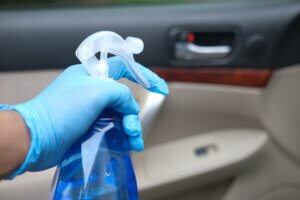When to Hire Vehicle Decontamination Experts
When to Hire Vehicle Decontamination Experts
Summary
Vehicles are integral to our daily lives but can become contaminated from various sources, requiring thorough decontamination. Contaminants may include harmful pathogens from infectious diseases or rodent infestations, accidental chemical spills, residue from transported hazardous materials, chemicals from airbag deployments, biohazards from accidents, or environmental factors like flood exposure or industrial emissions. Effective decontamination involves assessing the contamination, choosing the right cleaning agents, physical cleaning, disinfection, and seeking professional consultation when needed. Regular decontamination ensures occupant safety and extends vehicle lifespan.
In the modern world, vehicles are more than just a mode of transportation. They are vital instruments in our daily lives, connecting us with opportunities, businesses, and loved ones. But, like any other closed environment, vehicles can become contaminated, necessitating immediate decontamination. In this article, we delve deep into the situations that mandate vehicle decontamination.
Why Vehicle Decontamination Matters
It is crucial to understand that decontaminating a vehicle is not just about cleanliness or aesthetics. It involves eradicating harmful contaminants that could adversely affect our health and safety. Keeping vehicles free from contaminants ensures the safety and well-being of passengers and is a proactive step towards maintaining the vehicle’s functionality and longevity.
Biological Contamination and Vehicles
There are instances where vehicles might become carriers of infectious agents, making decontamination imperative.
Infectious Disease Exposure: If a person with a contagious illness has been in a vehicle, there’s a risk that the car’s interior might harbour pathogens. Especially in times of global pandemics, it becomes paramount to ensure that vehicles are thoroughly decontaminated to prevent disease spread.
Rodent Infestation: Rodents like rats and mice can leave droppings, urine, and nesting materials in vehicles. These can carry diseases like Hantavirus, leptospirosis, and more. A vehicle showing signs of rodent activity should be decontaminated immediately.
Chemical Contamination in Vehicles
Various scenarios can lead to the chemical contamination of a vehicle.
Accidental Spills: Everyday items, such as battery acid, brake fluid, or household chemicals, can spill in vehicles. These chemicals may not only damage the vehicle’s interior but can also pose health risks.
Transport of Hazardous Materials: If a vehicle has been used to transport chemicals or other hazardous materials, even if sealed properly, there remains a risk of residual contamination. Such vehicles should undergo rigorous decontamination.
Accidents and Vehicle Decontamination
Unfortunate events, like accidents, can also create a need for vehicle decontamination.
Airbag Deployment: When an airbag deploys, it releases certain chemicals to rapidly inflate the bag. These chemicals can linger in the vehicle’s interior and may require professional decontamination.
Biohazard Scenarios: Accidents involving injuries can lead to the presence of blood or other bodily fluids in the car. These are biohazards and require specialized decontamination methods.
Environmental Factors Leading to Contamination
The environment around us can sometimes be the source of contaminants affecting our vehicles.
Flood Exposure: Vehicles submerged in floods can get contaminated with mud, bacteria, and other harmful agents. They must undergo thorough cleaning and decontamination before being deemed safe for use.
Exposure to Industrial Emissions: If a vehicle is regularly parked near industries releasing harmful emissions or chemicals, it may accumulate these contaminants over time.
Steps for Effective Vehicle Decontamination
Assessment: Before initiating decontamination, it’s essential to identify the type and extent of contamination.
Choosing the Right Agents: Depending on the contaminant, select the right cleaning and disinfecting agents. It’s always advisable to consult professionals or refer to the vehicle’s manual.
Physical Cleaning: Use microfiber cloths and specialized brushes to clean surfaces, ensuring that no nooks or crannies are left untouched.
Disinfection: For biological contaminants, use recommended disinfectants. Ensure proper ventilation during and after the process.
Professional Consultation: If unsure about the decontamination process or if the contamination is severe, seek professional help.
In conclusion, vehicles, like any other environment, can be subjected to various contaminants. Recognizing the situations that require vehicle decontamination and acting promptly ensures not only the safety of the vehicle’s occupants but also plays a pivotal role in extending the life and efficiency of the vehicle. Whether it’s biological, chemical, accident-induced, or environmental contamination, knowing when and how to decontaminate your vehicle is essential.
FAQs
What is vehicle decontamination?
Vehicle decontamination refers to the process of thoroughly cleaning and disinfecting a vehicle to remove contaminants, such as dirt, pollutants, pathogens, or chemicals, ensuring that the vehicle is safe and free from harmful agents that could pose health risks to its occupants or degrade its performance.
Why is vehicle decontamination necessary?
Vehicle decontamination is vital for multiple reasons:
- Ensuring the safety and health of the passengers by eliminating potential pathogens or harmful chemicals.
- Extending the vehicle’s lifespan by preventing corrosion or damage caused by contaminants.
- Maintaining the aesthetic value of the vehicle, ensuring that it remains in its best possible condition.
How often should I decontaminate my vehicle?
The frequency of vehicle decontamination depends on its usage and exposure to contaminants. For vehicles in regular use and exposed to urban pollutants, deep decontamination is recommended every 6 months. However, if the vehicle has been exposed to specific contaminants like floodwaters, infectious diseases, or hazardous chemicals, immediate decontamination is essential.
Can I perform vehicle decontamination at home, or should I seek professional help?
Basic vehicle decontamination, like cleaning off dirt or minor spills, can be done at home using appropriate cleaning products. However, for severe contaminants, especially biohazards or hazardous chemicals, it’s advisable to seek professional services to ensure thorough and safe decontamination.
Why Choose AllAces?
Commuting in a dirty, or unhygienic car is not only uncomfortable, but it can pose a serious health risk. Professional car upholstery cleaning and vehicle decontamination experts can efficiently rejuvenate the interior of your car. Remediating even the most severe and stubborn of smells and stains, AllAces Cleaning & Restoration will deliver premium results. Leave the job to the professionals and secure yourself an effective and long-lasting car cleaning solution.



